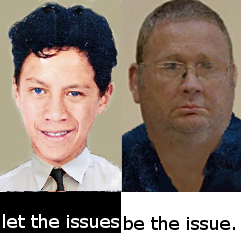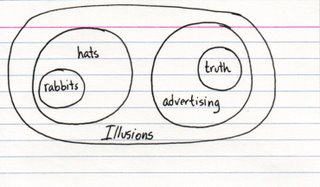Or, this is not a democracy, it’s a private residence, get used to it. But we need you, and you apparently need us, so let’s do what we can to get along.
Weblogs and online discussion forums are a type of feedback media, where the published content forms the opening chapter, not the entire story. In feedback media, there are broadly two groups of participants, who I’ll term proprietors and contributors; the former being those who operate the medium and provide its `official’ content, the latter those who participate in the medium by adding their own content. The nature of the relationship between these two groups is critical in determining how the medium functions. This post is a quick examination of how feedback media operate at a theoretical level, a survey of examples, and a rationale for dual-mode gatekeeping, with a view to creating an environment conducive to quality discourse which is largely free of personal feuds and partisan point-scoring.
The Dump Button
Though there are others, the canonical mainstream feedback media are the letters-to-the-editor page and talk radio. In either of those media, a proprietor has the unilateral ability to prevent or limit contributors’ participation – in the case of the newspaper editor, the mechanism is `points noted’; radio hosts have a button with which they can drop a caller between when she starts speaking and when she goes to air – traditionally, this timeframe is seven seconds. Blog proprietors have a range of similar devices at their disposal.
This has important implications when viewed in the light of one of the fundamental pieces of media theory – Stuart Hall’s encoding/decoding model, which argues that a given text is encoded with meaning by its creator, and that meaning is decoded by the person reading it, who can accept, partially accept or wholly reject the encoder’s frame of reference (not the content; that’s a different matter with which Hall was not largely concerned). In principle, the presence of gatekeeping mechanisms such as those described above means it’s virtually impossible to have a statement published which the proprietor doesn’t want to be there. The logical flipside of this is: if your comment gets published, it’s because the proprietor wants it to be published, and for their own reasons.
Symbiosis
Proprietors of feedback media generally have plenty of reasons for wanting to allow content to be published, the primary one of which is the symbiotic relationship they have with contributors. The nature of the content and the nature of the gatekeeping are the two primary factors which determine the tone of a medium; the former largely because of the contributors it attracts and the latter largely because of the contributors it drives away. When Lindsay Perigo took over from John Banks on his Radio Pacific talk show, many regular callers kept calling because the political content Perigo aired was quite similar. Banks was extremely tolerant of callers who took a while to get to the point – he rarely, if ever, cut people off, and he had a great deal of time for listening to peoples’ stories. Perigo was the opposite; he guided the show much more firmly and did not generally tolerate callers chatting about trivial or mundane matters, and that changed his audience and his contributors. Banks’ loyal callers became quite displeased when Perigo, for instance, dedicated an entire hour of his show to the songs of Mario Lanza, of whom they’d never heard, and became irate when he lost his temper with some of the more elderly callers and began to cut them off for not sticking to the programme or saying anything he considered meaningful. Gradually, the old callers stopped calling and were replaced by a new set: younger, less religious, sharper of tongue, etc.
Gatekeeping Models
Plenty of different gatekeeping models exist in practice. I’ll focus on four which are fairly archetypal. Each creates a different atmosphere.
1. Slashdot. The lunatic asylum model. Members control almost everything. This results in a community which is extremely tolerant of insults, memes, tomfoolery, and has an incredibly low signal to noise ratio.
2. Kiwiblog. The echo chamber model. Content is published by DPF, commented upon by members, who use a karma system and are subject to a demerit system (operated by DPF) which is more theoretical than anything. This results in a sort of groupthink; not because DPF enforces it, but because he allows his commentariat to do so, creating a recursive loop of abuse which deters dissenters from participating. There is an argument that DPF (who’s a thoroughly decent bloke, quite unlike his comment threads) keeps his blog this way in order to make himself look sensible and reasonable by comparison.
3. No Right Turn. The Holy Sepulchre model. Content is published by Idiot/Savant, and that’s what you get. Idiot/Savant took the opposite line to DPF and turned off comments altogether a good long while ago. The result is almost pure signal, very little noise. I/S is frequently referred to by and comments on other blogs to maintain the feedback aspect of his medium.
4. The Standard. The noisy tavern model. Content is posted and comments are moderated by a group of writers, and Lynn Prentice, who tolerates very little of the sort of abuse for which KB is known. In general this results in a more congenial atmosphere, with a wide range of dissenting voices who are usually treated with at least a modicum of respect. However, it still gets pretty heated because there is no clear delineation between content and conveyance.
The Living Room Model
Anita’s model for Kiwipolitico is of a living room in which robust and complex but civil and reasoned discussions take place. This implies rights and responsibilities, and although I’ve only recently moved in (as it were) I shall presume to list a few as I see them. These apply equally to proprietors and to contributors.
* You have a right to be treated as an honourable contributor and to be free from serious personal attacks, abuse or character assassination.
* You have a right to not have your personal or professional life dragged into a discussion unless you allow it, or it is somehow germane to a legitimate matter of debate.
* You have a responsibility to defend and substantiate your arguments and assertions, not to assume that because people here are civil you can get away with a weak argument or unproven claims.
* You have a responsibility to adhere to and enforce these standards of conduct to the extent you are able.
Sir Karl Popper (and others) argued that if a society is perfectly tolerant of any and all behaviour, it must tolerate behaviour which is destructive of toleration itself, eventually leading to a general absence of toleration. This is pretty clearly evident in the Slashdot and Kiwiblog examples above and to a lesser extent in The Standard example, where because of a greater or lesser lack of discipline, much worthwhile discussion is simply drowned out, and the signal to noise ratio drops. The problem is usually not with the arguments, which can be well-reasoned and supported; it is the attacks and epithets which accompany those arguments which deters dissent. Therefore, in order to privilege argument over attacks, the content to be argued and the means by which it is argued need to be treated separately. The living room model requires that there be little or no gatekeeping of argument itself, coupled with strict gatekeeping of the means by which that argument is conveyed – essentially: make what points you choose, but do so in good faith and in accordance with decent norms of conduct and reasoned debate.
The point and purpose of the model is to separate arguer and argument for the purpose of criticism. You should be vulnerable to critique only on the grounds of your arguments, your ideas, or your conduct. Good ideas and arguments, cleanly made and supported by evidence and logic, will thrive here regardless of their ideological bent, but arguments resorting to personal attacks, abuse, absurd hyperbole, rash generalisation or wilful misinterpretation to make a point will perish whether we agree with their premises or not, because these are the signs of a hollow argument which lacks a valid foundation. While you will be sheltered from personal attacks, don’t expect your argument to be sheltered or defended by the proprietors; indeed, we may take great glee in watching it be torn asunder, as long as the tearing is done in a civil, justified and reasoned fashion. Finally, toleration breeds toleration. If you consistently exhibit good character and careful arguments, occasional minor indiscretions may be overlooked. This is a privilege to be earned, and I hope everyone will earn it.
L



